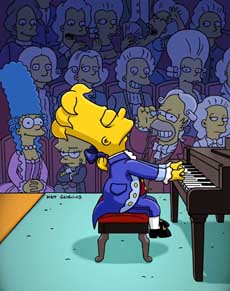![]() Criticism
Criticism
![]() Criticism
Criticism
Fleshing out Mozart’s Requiem no easy task
VSO production use a ‘new’ version of the unfinished piece
by David Gordon Duke
 It was probably inevitable; but somehow the image last season of none other than Bart Simpson as Wolfgang Amadeus Mozart (in the episode “Margical History Tour”) defines the unparalleled renown Mozart has achieved in recent decades. It’s more than the spin from Peter Shaffer’s 1979 hit play Amadeus: Mozart has become our age’s favourite classical music icon.
It was probably inevitable; but somehow the image last season of none other than Bart Simpson as Wolfgang Amadeus Mozart (in the episode “Margical History Tour”) defines the unparalleled renown Mozart has achieved in recent decades. It’s more than the spin from Peter Shaffer’s 1979 hit play Amadeus: Mozart has become our age’s favourite classical music icon.
This wasn’t always the case: Beethoven loathed the “immorality” of Mozart’s opera Così fan tutti. The Victorians found him lightweight. Many 20th century virtuosos considered his music “too easy” for their purposes.
On Saturday and Monday the VSO presents one of Mozart’s most durable hits, the Requiem, directed by Quebec early music specialist Bernard Labadie.
Requiems make surprisingly good box office. Something about the grand drama of death pulls in listeners. The tangled web of legends surrounding Mozart’s Requiem is an undeniable element of its particular appeal, but most, alas, are apocryphal. The commission came not from some mysterious Dark Sstranger, but from an eccentric patron hoping to pawn the resulting work off as his own. Mozart’s health, often dicey, was no worse than usual when he began the commission. He worked hard on the piece because chronic financial mismanagement meant he needed the money, not because he was planning the Requiem as some ultimate self-commemoration.
As it turned out, much of what has come down to us isn’t 100% Mozart anyway. When he died on December 5, 1791, he’d really only finished with a few portions of the score, with much of the rest merely sketched out. Others worked with the remnants. The adept but somewhat uninspired F.X. Süssmayr took on the unenviable task of getting the score ready for performance. Assisted composition was considered perfectly acceptable through much of music history, in the same way that artists had assistance with their canvasses or sculptures. The difference was that Süssmayr’s work wasn’t supervised, so no one will ever know exactly what Mozart might have done himself.
Vancouver listeners won’t be hearing the usual Mozart/Süssmayr mixture. This performance will use Harvard-based musicologist and pianist Robert Levin’s “new” version of the score, premiered in 1991. Levin’s edition attempts to get back to what Mozart intended by removing spurious or faked sections. Where restorative composition was required, Levin used his deep familiarity with the Mozart idiom and the results of painstaking research to achieve a credible, stylistically apt score.
The performance promises to get back to18th century basics as well. Bernard Labadie is the most interesting early music conductor in the country. At 19 he founded Les Violons du Roy, the Québec City orchestral ensemble devoted to 18th century repertoire. Les Violons isn’t strictly an “authentic instrument” ensemble: they play modern instruments, but in an performance idiom informed by historical practice. When he was here preparing a broadcast of the CBC Radio Orchestra a few years ago, Labadie’s approach took local players by storm — very rapid tempi, detached articulations, and fresh approaches to ornamentation and dynamics. Labadie belongs to a new generation of conductors who’ve gone methodically back to early treatises (including a famous how-to book by Mozart’s dad Homer — er, Leopold) and rethought how classical music sounded then; he’s not interested in perpetuating the conventions of 19th and 20th century orchestral tradition.
As Labadie’s career has expanded, he’s moved increasingly away from his handpicked group of Québec musicians, but he brings his revisionist style to other ensembles. Today he’s in constant demand, conducting in North America and Europe as well as acting as Artistic Director of Opéra de Montréal. The Requiem will be his first gig with the VSO, and the first opportunity our local audience has to see him in action. It should be memorable — whether or not Mozart himself would have recognized all we hear.
Vancouver Sun
19 NOv. 2004
 archives
archives